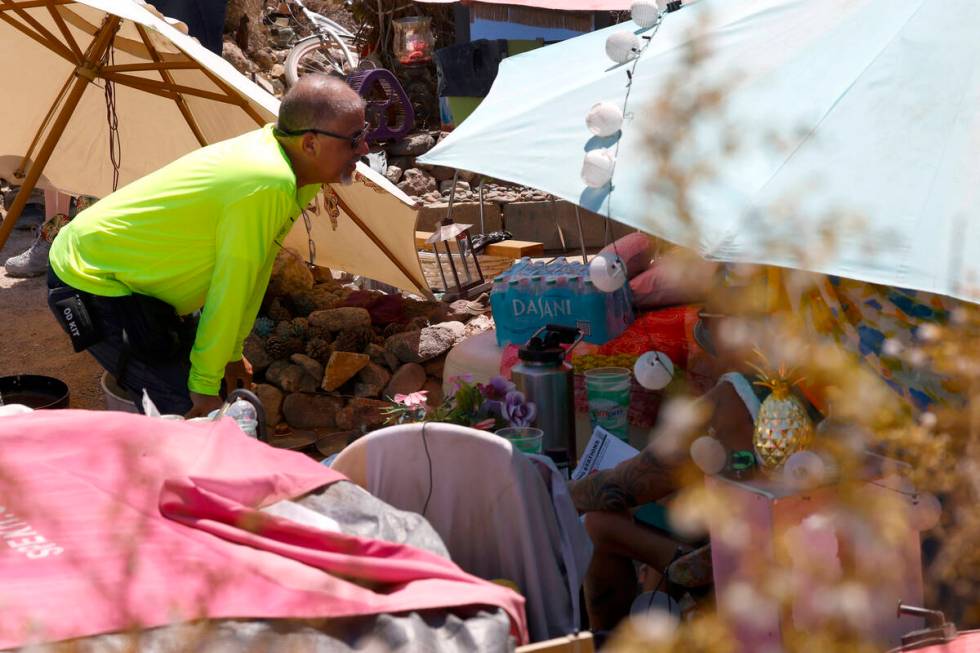‘Burners on high’: 2024 is the deadliest year for Las Vegas heat

Heat has claimed the lives of more people in 2024 in Southern Nevada than in any prior year on record, officials said.
The latest round of heat-related-death data from the Clark County coroner’s office, released on Thursday, shows that heat was a factor in the deaths of 342 people. It’s without question that the toll will continue to rise, especially as it can take up to 90 days to determine a cause of death — and whether heat was a factor.
Clark County began to pull out heat as a contributing factor in more deaths in 2021 when Melanie Rouse was named head of the office. It was then that the office began to look at heat as a separate contributing cause of death.
“We will inevitably see this number climb,” Rouse said in a Thursday interview.
Rouse, who based Clark County’s tracking on her experience investigating deaths in Phoenix, said she sees the country’s opioid and fentanyl crisis as inherently linked to rising heat-related deaths, as using drugs can decrease the body’s ability to regulate its temperature.
The previous record came in 2023 with 309 heat-related deaths, according to coroner’s office data. An update earlier this month placed this year’s total at 224.
This year has brought Las Vegas a record summer in many ways, made more intense by climate change, with the city experiencing its all-time record of 120 degrees. The city has seen more than 100 triple-digit temperature days — the most since 1947 — and more are expected this week, according to the National Weather Service.
Clark County even activated its cooling centers from Friday to Sunday — something usually not necessary at this time of year when summer heat will give way to a cooler fall.
“It’s like the burners are all the way on high,” said Ben Leffel, a UNLV professor who studies how cities should respond to climate change.
By the numbers
Of the 342 people who have died, the coroner’s office released the identities and death circumstances of 288 whose families have been notified.
Nearly 35 percent of those deaths relate to the use of drugs, including methamphetamine, fentanyl and cocaine. Drug-related deaths tend to spike in the summer months, Rouse said, underscoring an undeniable tie between drug use and extreme heat.
“We know that those drugs cause your body to not be able to thermoregulate properly,” Rouse said. “Those two things in combination are very lethal.”
The median age is 58, and many who have died had preexisting conditions such as heart disease, obesity or HIV/AIDS.
Still, heat can be deadly regardless of any of these risk factors, with otherwise healthy victims as young as 23.
Sin City’s death-dealing future
In Clark County, there’s been a concerted effort to better address heat risk as records become more easily breakable.
Much of the response thus far has come in the form of opening daytime cooling centers, triggered when the National Weather Service issues an excessive heat warning. They are often libraries or community centers where people can gather to escape heat, though academics are unsure how well used they are.
Following major heat events, the Desert Research Institute’s Southern Nevada Heat Resilience Lab regularly brings together about 90 representatives from local governments, nonprofits and community organizations to discuss short- and long-term solutions.
In the long term, both Clark County and UNLV are working to bolster tree canopy across the valley, especially focusing on areas considered “heat islands,” where foliage and green spaces needed to cool off neighborhoods are sparse.
Clark County Commission Chair Marilyn Kirkpatrick, who helped launch a public awareness campaign about heat at the beginning of the summer, said local officials are looking for ways to mitigate heat year-round.
“When these numbers come out, more people say: ‘My goodness, we’ve got to do more next year and do it for longer,’” Kirkpatrick said. “We don’t like to see any deaths.”
Leffel, the UNLV professor, said that while heat adaptation efforts are vital to Las Vegas’ long-term survival, slashing carbon emissions and slowing climate change should be a larger part of the conversation.
Comprehensive efforts to combat warming, such as the All-In Clark County plan and UNLV’s Rebel Climate Action Plan, are a step in the right direction, he said.
“Everybody is playing catch-up,” Leffel said. “You can only put so many Band-Aids on without attacking the source.”
Contact Alan Halaly at ahalaly@reviewjournal.com. Follow @AlanHalaly on X.